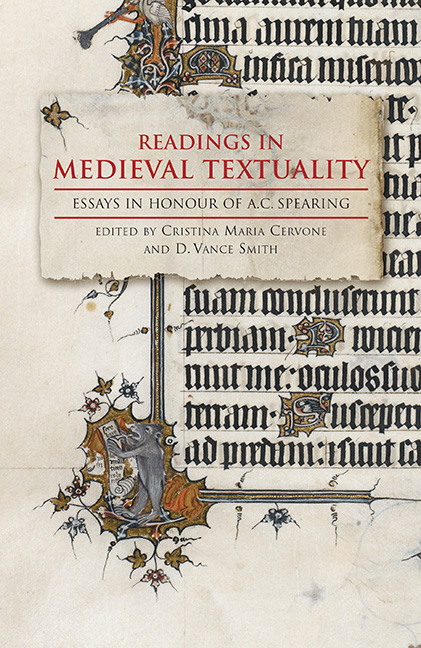Book contents
- Frontmatter
- Contents
- List of Illustrations
- List of Contributors
- A. C. Spearing's Work and Influence
- Bibliography of A. C. Spearing's Works
- I Reading Experience and Experientiality
- II Revisions and Re-visioning of Alliterative Poetry
- III Subjectivity and the Self
- IV Reading for Form
- V Epilogue
- Works Cited
- Index
- Tabula Gratulatoria
A. C. Spearing's Work and Influence
Published online by Cambridge University Press: 25 October 2017
- Frontmatter
- Contents
- List of Illustrations
- List of Contributors
- A. C. Spearing's Work and Influence
- Bibliography of A. C. Spearing's Works
- I Reading Experience and Experientiality
- II Revisions and Re-visioning of Alliterative Poetry
- III Subjectivity and the Self
- IV Reading for Form
- V Epilogue
- Works Cited
- Index
- Tabula Gratulatoria
Summary
This volume celebrates the work of A. C. Spearing, our teacher, colleague, and friend. Tony's influence has been strong in more than one area of medieval literary studies: his foundational The Gawain-Poet: A Critical Study (1970) has not been superseded; his Medieval Dream-Poetry (1976) shaped all subsequent work on dream visions; he is one of the seminal figures in Med/Ren studies because of his Medieval to Renaissance in English Poetry (1985); and his latest books, on subjectivity and narratology (Textual Subjectivity: The Encoding of Subjectivity in Medieval Narratives and Lyrics, 2005, and Medieval Autographies: The “I” of the Text, 2012), have drawn attention and critical controversy both within medieval studies and beyond, proving to be even more provocative and influential, perhaps, than his initial groundbreaking volume, Criticism and Medieval Poetry. It is hard to overstate the impression this, his first book, made when it came out in 1964. Spearing was immediately termed the first New Critic in Middle English studies (if not in medieval studies generally) and his subsequent studies of the Gawain-poet and Chaucer, which were read widely by audiences from high schools to universities, established him as a humane, subtle, and interesting reader of texts. His influence on formalist readings of medieval literature has been profound and inescapable.
In an unpublished lunchtime talk at his home university, the University of Virginia, in October 2004, just before the publication of Textual Subjectivity, Spearing succinctly laid out his own perception of his scholarship as he spoke of “My First Half-Century as a Medievalist”: “I haven't ceased to be a formalist, in the sense that I haven't ceased to place literary value at the centre of my studies or to believe that what can convincingly be said about literary texts can be related to the details of their verbal form.” The insight that attention to form can and must underlie our interpretations of literary texts remains one of Spearing's greatest contributions to the field of literary criticism of medieval texts.
- Type
- Chapter
- Information
- Readings in Medieval TextualityEssays in Honour of A.C. Spearing, pp. xi - xxviiPublisher: Boydell & BrewerPrint publication year: 2016

